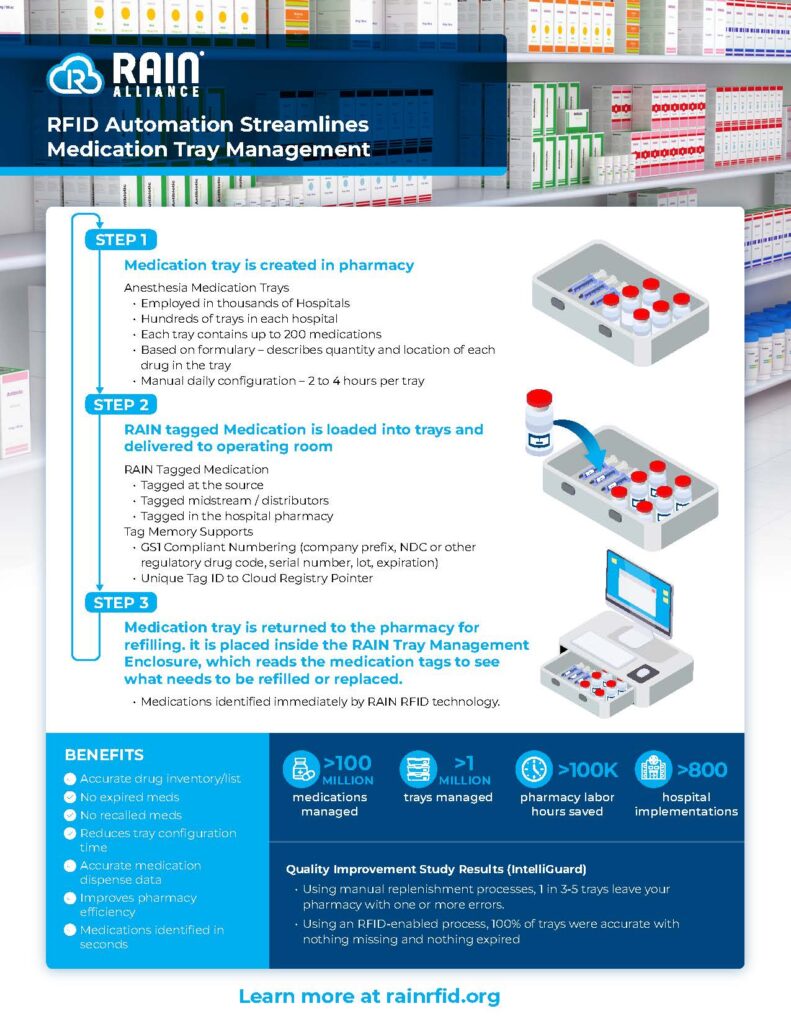In the fast-paced and ever-evolving world of healthcare, the need for efficient inventory management that helps streamline processes to save crucial clinical time while protecting patient safety has never been greater. RAIN RFID provides a low-cost, reliable wireless solution that promises to revolutionize the way we manage inventory in acute care facilities. But why is RAIN RFID such a game-changer for the healthcare industry and how it is making a positive impact today?
What is RAIN RFID?
RAIN RFID is a cutting-edge technology that uses small electronic tags attached to, or implanted within, medications and medical equipment to provide automated and accurate inventory. It accommodates industry-standard numbering systems such as GS1 and ISO, while also providing its own RAIN-based numbering, ensuring compatibility with all items in the healthcare market.
What makes RAIN RFID truly remarkable though is the unique identifier permanently stored in each RFID tag. This allows healthcare providers to seamlessly validate every item they use, helping reduce counterfeiting, and, most importantly, enhancing patient safety. And as RAIN RFID tags are able to harvest power from the RF Field they interact with, this means that each individual tag does not need its own battery, making it easier to incorporate into existing labels.
Why RAIN in Healthcare NOW?
The adoption of RAIN RFID is not a distant dream; it’s a reality in many healthcare facilities across the world. Over 800 hospitals in the United States alone have embraced this technology, bringing about significant efficiencies in various aspects of healthcare operations.
For pharmacists, RAIN RFID provides a streamlined and accountable approach to medication management. Meanwhile, anesthesiologists benefit from the accurate tracking of narcotics and controlled substances, ensuring that these vital resources are used safely and responsibly. RAIN RFID’s high-performance tags and readers enable precise tracking of items in dispensing drawers, inventory cabinets, and shelves.
Download the infographic, which illustrates how RAIN RFID is used in medication tray management.
The release of GS1’s Tag Data Standard 2.0 further enhances RAIN RFID’s capabilities. It allows for the encoding of crucial information like company prefixes, NDC, serial numbers, lot numbers, and expiration dates in a single memory bank. This facilitates high-speed, accurate collection of tag identifiers and contributes to a more efficient healthcare supply chain.
The AXIA Institute at Michigan State University is actively involved in grading tagged items and linking these grades to end-use systems. This approach ensures robust item identification and is helping to fulfill the vision of revolutionizing the healthcare supply chain.
Benefits of RAIN RFID in Healthcare
There are many advantages of implementing RAIN RFID in healthcare:
- Efficiency: RAIN RFID medication management systems reduce the time required to analyze and replenish a medication tray by 75%, allowing healthcare professionals to focus on patient care instead of inventory management.
- Cost Savings: RAIN RFID optimizes inventory spending, improves cost recovery, and reduces waste, ultimately contributing to more cost-effective healthcare.
- Patient Safety: This technology ensures the safety of patients by avoiding the use of expired or recalled products, improving item availability, and enhancing the accuracy of medical records.
A study conducted by IntelliGuard demonstrates the transformative power of RAIN RFID. Using manual replenishment processes, one in every three to five trays left the pharmacy with errors. In contrast, when an RFID-enabled process was employed, 100% of trays were accurate, with nothing missing and nothing expired.
Case study: Fresenius Kabi RFID-Enabled Medications
Fresenius Kabi, a company with a mission to provide lifesaving medicines and technologies to those who care for patients, is an example of how RFID technology is making a difference. With a growing portfolio of products dedicated to critical and chronic care, they offer injectable drugs in vials and syringes, biosimilars, and specialty pharmaceuticals, focusing on rare and chronic diseases.
Their +RFID portfolio of medications are tagged with RAIN RFID at the source. These tags are encoded with crucial drug information using GS1 Tag Data Standards, ensuring readability and interoperability for hospital customers. This initiative saves hospitals valuable time and effort compared to manual tagging practices.
Creating a united ecosystem
RAIN RFID has the potential to transform medication management in hospitals, making the process of identifying, managing, and locating medications significantly more straightforward. And, more importantly, it offers enhanced patient safety, streamlined operations, and cost savings.
Stakeholders from throughout the ecosystem are already coming together to create standards, guidelines and best practices within collaborative not-for-profit forums such as the RAIN Alliance Healthcare Working Group. Through this collaboration, RAIN RFID technology has the power to transform the healthcare ecosystem, bringing ergonomic, sustainable and dependable best practices that deliver unparalleled operational efficiency.

